Top 10 Startups of the Month: June 2025 Edition

The most promising ventures are redefining industries in the UK and across the globe.
Editor's Note
In the world of innovation, hype is cheap. What’s rare is proof.
Each month, we hunt for startups that aren't just chasing capital — they're changing something fundamental.
Not future promises, but present prototypes. Not elevator pitches, but working products.
The ten ventures below have entered 2025 with more than ambition.
They’ve launched, deployed, scaled, or sparked global conversations. They’re messy, flawed, and unfinished.
That’s exactly why they matter.
From fusion power to orbital factories, these are not hypothetical. They're the first signs of what the next economy will be built upon.
Top 5 UK Startups
1.Space Forge (Cardiff)
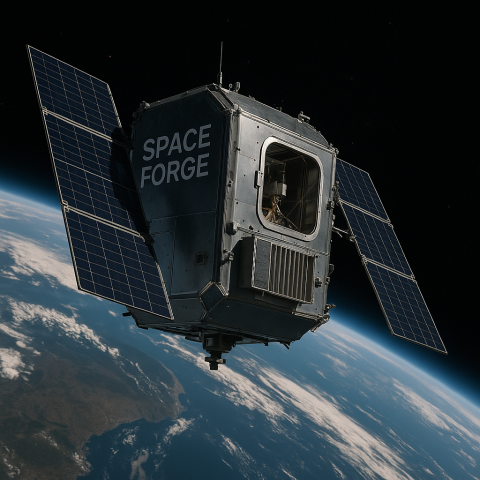
In June 2025, they successfully launched ForgeStar‑1, the world’s first returnable satellite designed for in-space manufacturing.
Why space? Microgravity and vacuum conditions allow for the creation of purer, more efficient semiconductors and alloys — materials that are extremely difficult or costly to produce on Earth.
In-orbit manufacturing unlocks a new class of advanced materials: ultra-clean crystals for quantum computing, next-gen superconductors for fusion power systems, and high-performance alloys that can survive the temperature extremes of space or hypersonic flight.
For AI chips, quantum computing, and clean tech, this matters.
ForgeStar‑1 is fully autonomous, modular, and designed for multiple re-entries. It doesn’t just produce parts — it learns, optimises, and returns its output to Earth for real-world use.
Backed by the ESA and NATO Innovation Fund, Space Forge has moved from pitch to payload. If it works, the factory of the future may orbit 400km above Cardiff.
"Some startups build MVPs. These folks launched theirs into orbit."
2.Nyobolt (Cambridge)
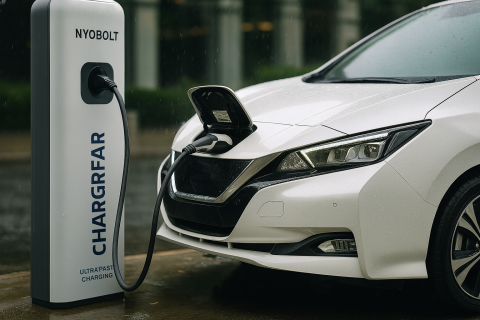
Five-Minute Charging, Finally Real
You’ve heard the claim before: ultra-fast batteries. Nyobolt may be the first to make it work.
Founded by Cambridge researchers, the startup’s latest lithium-ion tech leverages niobium-based anodes to deliver an 80% charge in just five minutes.
In April 2025, they raised £23.5 million to scale EV and robotics applications.
What sets Nyobolt apart isn’t just speed — it’s cycle life and thermal stability. Their cells retain performance after thousands of rapid charges, addressing the Achilles' heel of most fast-charging systems.
They’re also compact, making them ideal for electric mobility platforms, industrial robots, and high-draw energy tools where downtime is not an option.
From lab to production pilots, the company is now working with manufacturers across Europe and the US.
Speed matters. So does durability. Nyobolt is chasing both.
"They didn’t just shrink the wait. They may have rewritten the equation."
3.Skyrora (Glasgow)

In 2025, Skyrora is set to do what no UK company has managed in decades: launch an orbital satellite from British soil.
Their suborbital rockets have already proven they can fly. Quietly, consistently.
But this year marks a shift. The company is preparing for full orbital deployment — using modular launch platforms and custom engines built not for headlines, but for harsh terrain and limited infrastructure.
The fuel? A proprietary blend partly derived from recycled plastic. The goal isn’t just lift-off — it’s sustainability, simplicity, and speed. Skyrora wants to make small satellite launches boring, reliable, and sovereign.
From a 3D-printed engine plant in Scotland to mobile launchpads on coastal soil, everything about their setup suggests autonomy — not dependency.
With support from the ESA and a clear political tailwind, Skyrora isn’t just building rockets. They’re restoring a capability the UK quietly lost — and may need again.
"Rocket science isn’t dead. It just moved north."
4.Flock Mobility (London)
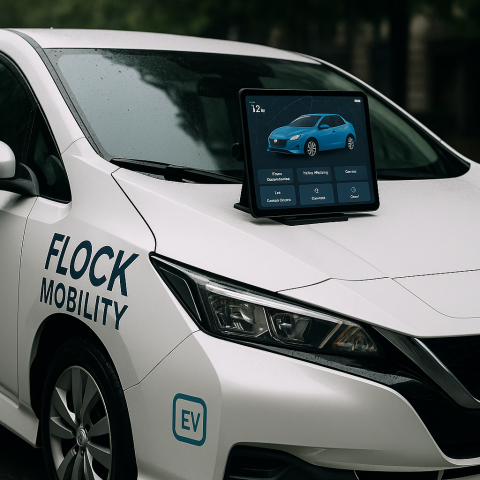
What if corporate mobility didn’t mean chaos?
Flock Mobility raised £950,000 this year to answer that.
Their platform uses AI to optimise electric vehicle fleets for hospitals, construction firms, and campuses.
Clients like the NHS are already piloting it to reduce costs and emissions.
But this isn’t a dashboard with graphs. It’s a system that quietly makes the right decisions: when to charge, where to reroute, how to scale.
No nudging, no alerts — just fewer headaches by design.
Flock isn’t trying to disrupt transport. It’s just cleaning it up.
One fleet, one policy doc, one spreadsheet at a time.
In a world where electrification is mandatory, Flock offers clarity, not complexity.
"It’s boring. It’s brilliant. It saves money."
5.Ryft (Manchester)

Ryft isn’t reinventing payments. They’re just making them finally work — for sellers, platforms, and regulators. All at once.
In April 2025, the startup raised £5.8 million to expand its infrastructure for split payments — a technical challenge most platforms ignore until it’s too late. Ryft didn’t.
Their system handles commission breakdowns, tax compliance, and payout logic — the messy plumbing under every two-sided marketplace. Think Etsy, but with fewer spreadsheets.
What makes Ryft different is that it doesn’t aim for disruption. It aims for continuity. Transactions run smoother. Audits run faster. Sellers get paid exactly what they’re due, exactly when they expect.
The company is already profitable. They didn’t burn to scale — they earned their way in.
While most FinTechs chase branding deals and unicorn status, Ryft quietly became essential infrastructure for platforms that actually sell things.
This isn’t payments 2.0. It’s the version that finally works.
"This is what infrastructure looks like when it stops apologising for being boring."
Top 5 Global Startups
1.Xona Space Systems (California, US)
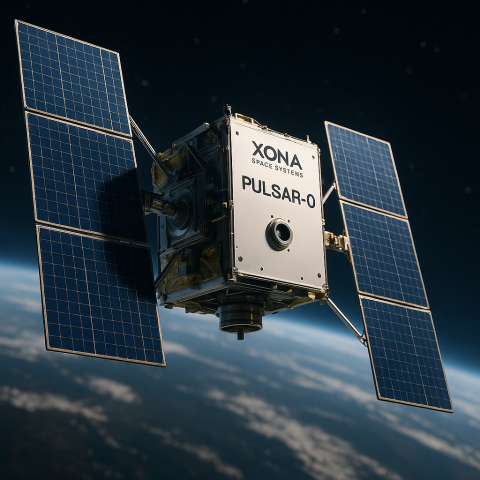
In June 2025, Xona launched Pulsar‑0 — the first private satellite in what could become the world’s most precise alternative to GPS.
It’s not just another cube in the sky.
Pulsar is part of a new PNT (Positioning, Navigation, Timing) system built for a world that doesn’t trust legacy infrastructure anymore.
GPS is old. It’s slow. And in contested regions, it’s disturbingly easy to jam. Pulsar isn’t.
Xona’s satellites operate on encrypted bands, deliver centimetre‑level precision, and offer regional autonomy — a must for autonomous vehicles, drone corridors, and defence systems that can’t afford to guess.
Backed by Space Force affiliates and $92 million in private funding, the system is no longer on paper.
It’s operational.
Most people won’t notice the difference. Until they do — when it matters most.
"Redundancy isn’t paranoia. It’s preparedness."
2.Halter (New Zealand)
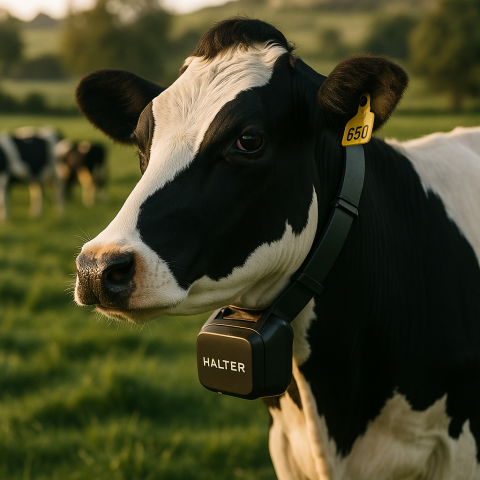
The Internet of Cows
New Zealand’s Halter just became its newest unicorn — and possibly the quietest.
The startup builds solar-powered smart collars for livestock. Not for tagging, not for counting. For managing. Farmers use the Halter app to set virtual fences, move herds, and monitor animal health — without stepping outside.
It started on a few New Zealand farms. Now, it’s on 150+ ranches across 18 US states.
The tech is simple on the surface: GPS, motion sensors, cellular uplink. But the impact is anything but. Halter eliminates quad bikes, manual labour, and hours of guesswork — replacing them with a silent system that just works.
Most agri-tech startups stay in demo mode. Halter didn’t. They built hardware farmers don’t hate, software they actually use, and a business model that scales without subsidy.
With $100 million raised in Series D and adoption spreading from Oregon to Alabama, Halter may have cracked the code: don’t sell farmers a future. Sell them time.
"It’s not the future of farming. It’s the present, wearing a collar."
3.VO/D (New York, US)

Where Consumer Goods Meet Culture
VO/D didn’t build a product. They built a system for producing relevance.
Their first release — 1UP Candy — launched not with a press release, but with celebrity partners and shelf space in 12,000 stores. It wasn’t viral. It was calculated.
This is what happens when branding becomes infrastructure. The team behind VO/D didn’t try to chase culture — they partnered with people who define it. Athletes. Artists. Names that move both units and sentiment.
With $5 million in early funding and a pipeline of functional food and wellness SKUs, VO/D is treating consumer products the way streaming platforms treat shows: fast turnaround, strong pilots, and a bet that one will blow up.
It’s not about margins. It’s about momentum. Build the relationship first — the rest follows.
Most startups pitch disruption. VO/D sells desire. And for now, it’s working.
"They’re selling more than candy. They’re selling cool."
4.Ciroos (US)

An AI Teammate for Infrastructure Engineers
Ciroos isn’t an observability tool. It’s a colleague that doesn’t sleep.
Built for site reliability engineers, Ciroos helps teams detect, diagnose, and resolve failures — not through dashboards, but through decisions.
It ingests logs, traces, telemetry, and starts suggesting answers before the pager even buzzes.
In a world of always-on infrastructure, most tools offer data. Ciroos offers judgement.
It’s already running in production at mid-sized cloud providers and fintech platforms, where every minute of downtime comes with a price tag.
With $21 million in funding and a product that feels more like a teammate than a terminal, Ciroos isn’t pitching AI. It’s using it — quietly, precisely, and exactly where it matters.
DevOps didn’t ask for help. Ciroos showed up anyway — and stayed.
"Uptime just found a new team member."
5.Proxima Fusion (Germany)
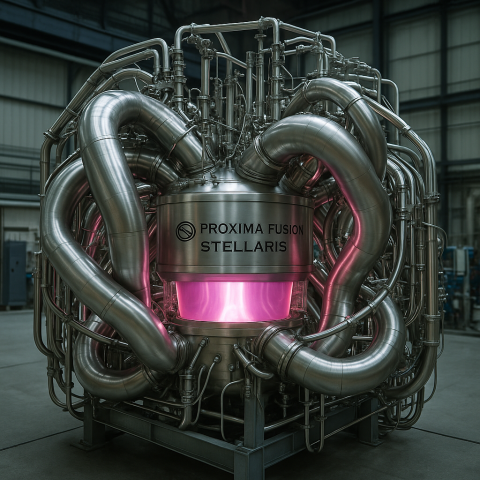
Europe’s Fusion Bet Just Got Real
Proxima Fusion unveiled its "Stellaris" prototype in early 2025 — a new take on the stellarator, designed not for theory but for traction.
Fusion has always been a horizon technology — just out of reach, just around the corner.
Proxima isn’t promising miracles. They're promising engineering.
The design is compact, modular, and built for manufacturability — words rarely used in fusion.
Backed by €130 million in Series A funding and supported by a coalition of European research labs, Proxima is pushing the field toward commercial relevance.
The early tests are encouraging.
No breakthroughs. No hype. Just hardware.
It’s still years away. But this is where the timeline starts — not in headlines, but in metal, magnets, and math.
"Everyone wants limitless energy. Proxima might’ve just built the timeline."
Cast Your Vote
Which of these startups deserves the June spotlight? We’re inviting readers to vote on their favourite — not just the flashiest, but the one you’d bet on.
Vote here - https://www.facebook.com/prime.economist
Editor’s Pick
Every month, I look for signs of the future that are real, even if they're quiet. Especially if they are.
This month, the nod goes to Space Forge. No demo day flash. No press frenzy. Just a working satellite — and a bet on physics over PowerPoint.
Some startups iterate. Some invent. They launched.